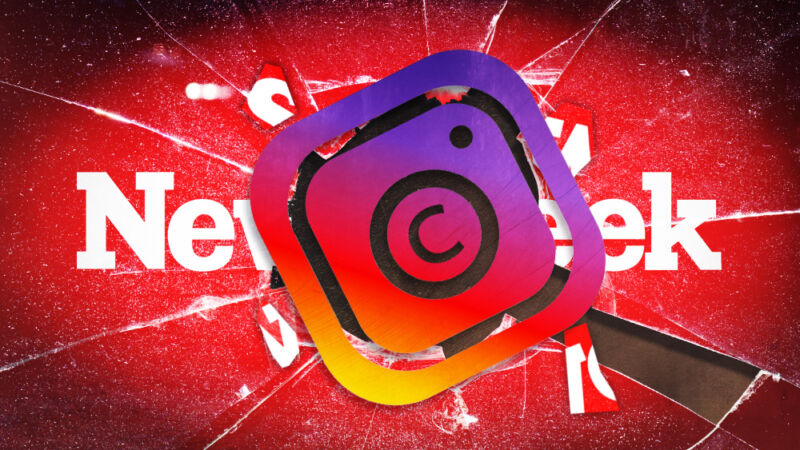
Instagram does not provide users of its embedding API a copyright license to display embedded images on other websites, the company said in a Thursday email to Ars Technica. The announcement could come as an unwelcome surprise to users who believed that embedding images, rather than hosting them directly, provides insulation against copyright claims.
“While our terms allow us to grant a sub-license, we do not grant one for our embeds API,” a Facebook company spokesperson told Ars in a Thursday email. “Our platform policies require third parties to have the necessary rights from applicable rights holders. This includes ensuring they have a license to share this content, if a license is required by law.”
In plain English, before you embed someone’s Instagram post on your website, you may need to ask the poster for a separate license to the images in the post. If you don’t, you could be subject to a copyright lawsuit.
Professional photographers are likely to cheer the decision, since it will strengthen their hand in negotiations with publishers. But it could also significantly change the culture of the Web. Until now, people have generally felt free to embed Instagram posts on their own sites without worrying about copyright concerns. That might be about to change.
Two lawsuits, different results
Newsweek recently found this out the hard way. Photographer Elliot McGucken took a rare photo (perhaps this one) of an ephemeral lake in Death Valley. Ordinarily, Death Valley is bone dry, but occasionally a heavy rain will create a sizable body of water. Newsweek asked to license the image, but McGucken turned down their offer. So instead Newsweek embedded a post from McGucken’s Instagram feed containing the image.
McGucken sued for copyright infringement, arguing that he hadn’t given Newsweek permission to use the photo. Newsweek countered that it didn’t need McGucken’s permission because it could get rights indirectly via Instagram. Instagram’s terms of service require anyone uploading photos to provide a copyright license to Instagram—including the right to sublicense the same rights to other users. Newsweek argued that that license extends to users of Instagram’s embedding technology, like Newsweek.
Newsweek had reason to be optimistic about this argument because Mashable won a very similar case in April. The judge in the Mashable case ruled that photographer Stephanie Sinclair “granted Instagram the right to sublicense the photograph, and Instagram validly exercised that right by granting Mashable a sublicense to display the photograph.”
But in a surprise ruling on Monday, Judge Katherine Failla refused to dismiss McGucken’s lawsuit at a preliminary stage. She held that there wasn’t enough evidence in the record to decide whether Instagram’s terms of service provided a copyright license for embedded photos.
Instagram’s bombshell
Now Instagram has dropped another bombshell that throws the entire premise of Newsweek’s defense into doubt.
“Wow. That is going to blow up the Sinclair case,” Cornell copyright scholar James Grimmelmann wrote after I shared Instagram’s comment with him.
By stating outright that users of its embedding feature don’t get licenses from Instagram to display photos, Instagram is preventing future defendants from using Mashable’s argument. It will be hard for Newsweek to convince a judge that it had a sublicense from Instagram when Instagram has explicitly claimed the opposite.
Instagram tells Ars that it’s exploring the possibility of giving users more control over photograph embedding. Right now, Instagram users can block embedding of their posts by switching their Instagram account to private. But that will also prevent users on the Instagram platform from seeing their content, too, which can be a career liability for professional photographers. Right now, Instagram offers no option to make content public inside the Instagram app while disabling embedding on external websites.
Kim Almazan, a copyright litigator at the law firm of Withersworldwide, argues that the safest route is for media companies to ask photographers for permission before embedding their work in news articles—and to use another photo if the photographer says no.
The “server test” is more important than ever
Newsweek has a couple of other legal options. Newsweek claimed fair use, but Judge Failla seemed skeptical of this argument in Monday’s ruling.
Grimmelmann pointed to another argument Newsweek might raise: that Instagram—not Newsweek—was the distributor of the photograph.
An embedded Instagram post is actually a bit of code that instructs the user’s browser to fetch the contents of a post—such as McGucken’s photograph—directly from Instagram’s servers. In the past, courts have ruled against plaintiffs in embedding cases based on the “server test,” which holds that liability goes to whomever runs the server that actually delivers infringing content to the user—in this case, Instagram.
This argument is binding law in the 9th Circuit, which includes California (and therefore covers a lot of technology companies). Appeals courts in most other circuits haven’t ruled on the question one way or the other. A federal trial judge in New York rejected the server test 2018, creating a worrying precedent for defendants. But because it was only a trial court ruling, it wasn’t binding on other judges.
Instagram’s decision to throw users of its embedding API under the bus makes the server test crucial for cases like this. If the server test is adopted outside the 9th Circuit, it could provide a legal basis for the continued use of embedded Instagram posts. On the other hand, if the 2nd Circuit—which covers New York—ultimately rejects the server test, then it would become legally hazardous to use Instagram embeds without a separate copyright license.
Grimmelmann notes that Facebook’s statement is “studiously noncommittal” about whether the server test is the law.
At this point, Newsweek’s best chance is likely to be to raise a server test defense. Eventually, the case may make its way to the 2nd Circuit Appeals Court, which will have to decide whether it wants to follow 9th Circuit precedent—which could make it a de facto national standard—or reject the server test and throw the legality of embedding into doubt nationwide.
https://arstechnica.com/?p=1681121

